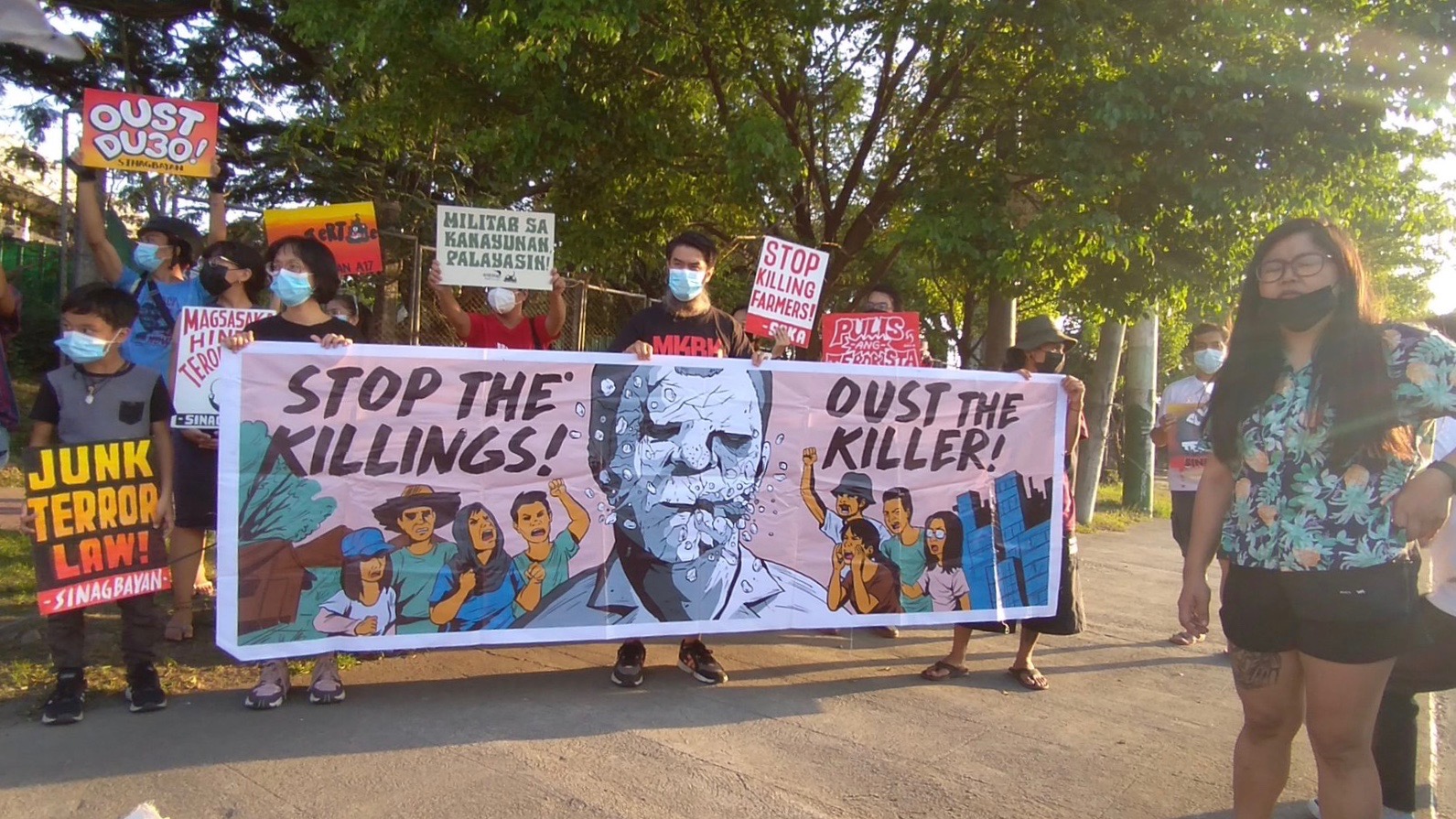Progressive forces across the Philippines have condemned the bloody raids conducted by security forces in the mainland Southern Tagalog region, adjacent to the capital region, on Sunday, March 7. Just hours after the slew of raids killed nine people in a day – what activists are calling the “Bloody Sunday” – rights groups and civil society movements held a demonstration outside the Commission of Human Rights (CHR) in Quezon City, demanding action against the security forces.
The raids were undertaken early in the morning at multiple locations across the region on Sunday. According to Rappler, the raids led to at least nine deaths, at least six arrests, and nine “at-large” notices. The raids were joint operations of the Philippines National Police (PNP) and the Armed Forces of the Philippines (AFP) in four locations, Laguna, Cavite, Batanga and Rizalm – all in the Calabarzon region in the outskirts of Metro Manila.
On March 5, president Rodrigo Duterte had announced that he had ordered the military and the police force to “finish off” and “kill” all the communist insurgents in the country. Duterte said that he has “told the military and the police, that if they find themselves in an armed encounter with the communist rebels, kill them, make sure you really kill them, and finish them off if they are alive.”
According to reports by local human rights groups, all those killed or arrested were peasant organizers who had been red-tagged (based on allegations of association with the banned Communist Party of the Philippines) as militants by the police. The raids come at a time when the government is facing as many as three dozen petitions against the controversial Anti-Terrorism Act (ATA) it passed last year, in which political killings have been particularly scrutinized.
Defend-Southern Tagalog, a local human rights movement fighting against state impunity, dubbed the day of the raids as “Bloody Sunday”. Charm Maranan, spokesperson of Defend-Southern Tagalog, pointed out that the warrants issued for these raids were defective and need to be scrutinized closely. “The warrants have a template. Only the names and addresses were changed,” said Maranan.
Activists and social organizations have likened these raids to the many violent extra-judicial killings conducted by security forces in the Negros Island. According to Bulatlat, human rights movement Karapatan has found that the warrants used in these raids were all alike and were issued by only two judges. Regional courts in the Philippines have been notorious in sanctioning raids like these by handing out “copy-paste” warrants, especially in Negros Island, where the maximum number of extrajudicial killings of activists take place.
“To the judges who issued the search warrants, you violated due process. What is your agreement with the PNP?,” said Raymond Palatino of the left-wing group BAYAN’s National Capital Region branch during a demonstration outside the CHR. Among those killed in the raids was Emmanuel “Manny” Asuncion, secretary general of BAYAN in Cavite.
Calling on the CHR to investigate the raids, Karapatan leader Christina Palabay strongly condemned the raids. “Our calls for justice ring louder more than ever as we demand the release of all those arrested in Southern Tagalog and all political prisoners, and to hold accountable the perpetrators of the killings in the region today,” Palabay said.
According to Karapatan’s own findings, between July 2016 (when Duterte came to power) and June 2020, over 312 people have been killed “in the course of the Philippine government’s implementation of its counterinsurgency program,” of whom 182 were activists and human rights advocates.
Government agencies’ response
In the meanwhile, responding to the outrage and protests over the murders, the CHR released a statement admonishing the government’s failure to protect the life and rights of citizens. In the statement released on Monday, March 8, spokesperson Jacqueline de Guia said that the CHR is “yet to see a concrete response to our repeated plea for a tangible reduction of violence on the ground.”
“All necessary actions must be done to demonstrate our genuine regard for life and to truly address the impunity and stop further killings,” De Guia added in the statement.
Justice secretary Menardo Guevarra has said that the department will include the Sunday killings in its ongoing special task force investigation into extrajudicial killings. Guevarra recently admitted wrongdoings before the UNHRC in anti-drug operations that led to killings of suspects.
Expressing his disappointment, Guevarra said, “I was really hoping that with that statement I made before the UN, our law enforcers would be more careful in their operations but these things continue to happen so we really need to sit down with Philippine National Police (PNP), with the Philippine Drug Enforcement Agency (PDEA), and with other law enforcement to make sure that these things don’t happen anymore, so it could be avoided.”
(Based on reports from Bulatlat and Rappler)





